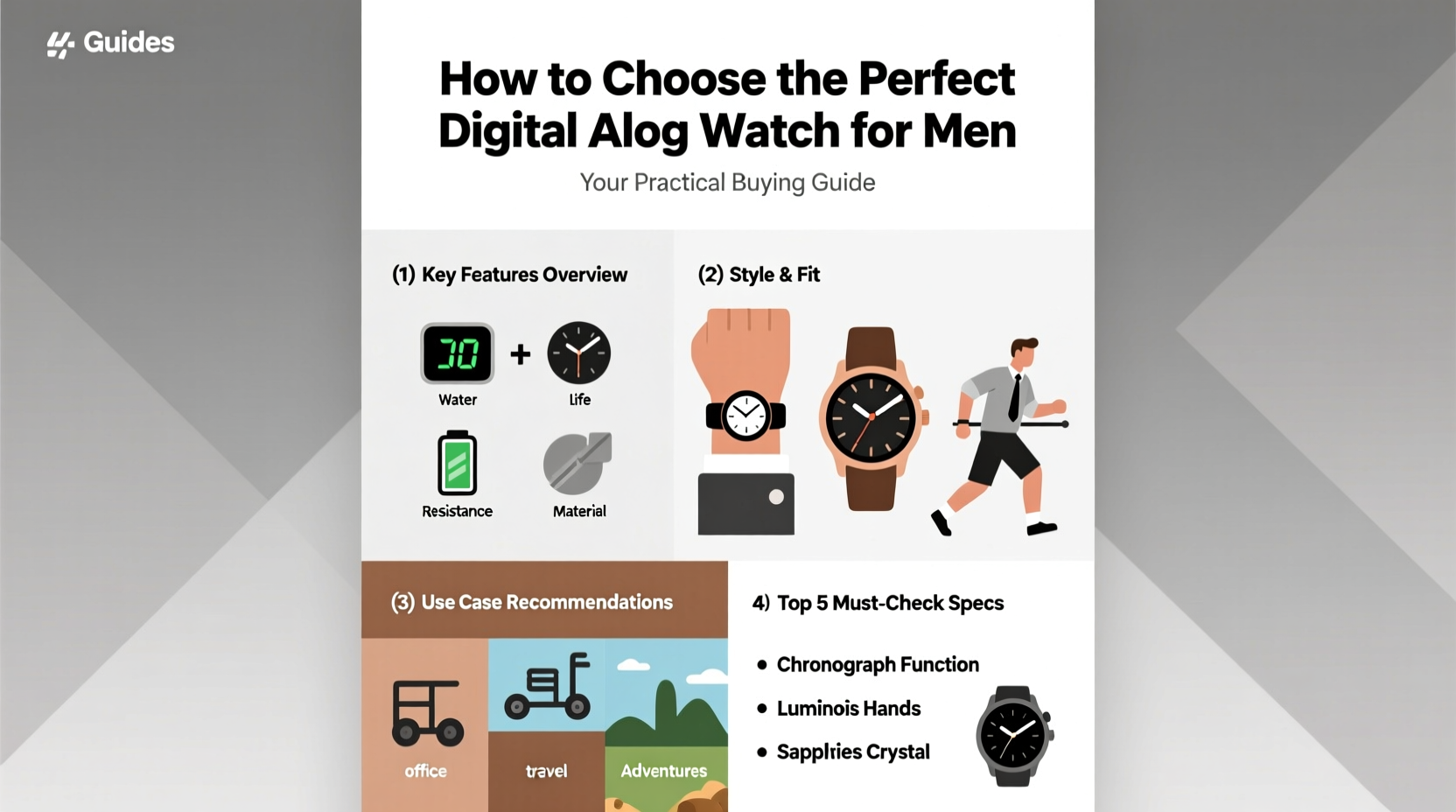In an age where smartphones dominate timekeeping, the wristwatch remains a powerful symbol of personal style and precision. For men seeking both functionality and elegance, the digital analog watch—a hybrid that combines traditional hands with digital displays—offers the best of both worlds. These timepieces provide accurate timekeeping, advanced features like chronographs and alarms, and a classic aesthetic enhanced by modern tech. But with countless models on the market, selecting the right one requires careful consideration. This guide walks through every critical factor—from design and durability to movement type and brand reputation—so you can make a confident, informed decision.
Understand What a Digital Analog Watch Is

A digital analog watch integrates mechanical or quartz-driven hands (analog) with an electronic digital display, typically in an LCD or LED format. This dual-display setup allows users to read the time traditionally while accessing additional data such as date, stopwatch functions, timers, battery life, and even altimeter or compass readings in more advanced models.
These watches are particularly popular among professionals, outdoor enthusiasts, and style-conscious individuals who value versatility. Unlike purely digital watches, which may appear utilitarian, digital analog models maintain a refined look suitable for both casual and semi-formal settings.
“Hybrid watches bridge the gap between heritage craftsmanship and modern innovation. They appeal to men who appreciate tradition but don’t want to sacrifice functionality.” — Daniel Reed, Horology Consultant at Timepiece Review Journal
Key Features to Evaluate Before Buying
When shopping for a digital analog watch, several technical and aesthetic elements should influence your choice. Prioritize these core aspects to ensure long-term satisfaction:
- Movement Type: Most digital analog watches use quartz movements powered by batteries, offering high accuracy (+/- 15 seconds per month). Some premium hybrids include solar-powered or kinetic movements that reduce battery replacements.
- Water Resistance: Look for at least 50 meters (5 ATM) if you plan to wear it during swimming or heavy rain. Divers or adventurers should consider 100 meters or more. <
- Display Clarity: The digital segment should be easy to read under sunlight and low light. Backlit screens enhance nighttime visibility.
- Battery Life: Standard batteries last 2–3 years; solar-powered variants can run up to 10 years without replacement.
- Case Material: Stainless steel offers durability and a polished finish. Titanium is lighter and corrosion-resistant, ideal for active lifestyles.
- Strap Options: Leather exudes sophistication; silicone or rubber suits sports use; metal bracelets offer longevity and adjustability.
Compare Top Brands and Models
Not all digital analog watches deliver equal performance or build quality. Below is a comparison of leading brands known for reliability, innovation, and design excellence:
| Brand | Model Example | Water Resistance | Battery Life | Price Range (USD) |
|---|---|---|---|---|
| Casio | G-Shock GA-2100 | 200m | 3 years | $100–$150 |
| Seiko | Ananta Chronograph | 100m | 2 years | $300–$500 |
| Tissot | T-Touch Connect Solar | 100m | Solar rechargeable | $700–$1,200 |
| Fossil | Hybrid HR Round | 30m | 6 months | $250–$350 |
| Timex | Intelligent Quartz Chronograph | 50m | 2 years | $120–$180 |
Casio leads in ruggedness and value, especially with its G-Shock line. Seiko blends Japanese engineering with elegant design. Tissot targets professionals needing smart-integrated features without full smartwatch dependency. Fossil offers fashion-forward hybrids, while Timex delivers dependable mid-range options.
Step-by-Step Guide to Selecting Your Ideal Watch
Follow this logical sequence to narrow down your options efficiently:
- Define Your Primary Use: Will it be worn daily, during workouts, in formal settings, or for outdoor activities? This determines water resistance, material, and feature needs.
- Set a Realistic Budget: Entry-level hybrids start around $80; premium models exceed $1,000. Decide how much you’re willing to invest based on expected lifespan and usage frequency.
- Choose Case Size and Fit: Men’s watches typically range from 40mm to 46mm. Measure your wrist: under 6.5” favors 40–42mm; over 7” can comfortably handle 44mm+. Ensure the lug-to-lug distance doesn’t extend beyond your wrist edges.
- Test Functionality Needs: List must-have features—chronograph, alarm, backlight, world time, etc.—and eliminate models lacking them.
- Verify Authenticity and Warranty: Purchase from authorized dealers. Reputable brands offer 2–5 year international warranties.
- Try It On (If Possible): Even online buyers should check return policies. Weight, strap comfort, and crown placement affect daily wearability.
Real-World Scenario: Choosing the Right Watch for a Frequent Traveler
James, a sales executive based in Chicago, travels internationally twice a month. He needed a watch that could withstand airport security checks, track multiple time zones, survive humidity changes, and still look professional during client meetings.
After evaluating several options, he chose the Seiko Ananta Chronograph. Its 100m water resistance handled tropical downpours, the dual-time display simplified jet lag management, and the stainless steel case maintained polish after months of use. The sapphire crystal resisted scratches from luggage handling, and the automatic backlight activated seamlessly in dimly lit flights.
This example illustrates how aligning lifestyle demands with specific watch capabilities leads to smarter purchases.
Dos and Don’ts When Buying a Digital Analog Watch
| Do’s | Don’ts |
|---|---|
| Check if the digital display updates in real-time | Assume water resistance means swim-proof without verifying depth rating |
| Opt for scratch-resistant crystals (sapphire or mineral glass) | Ignore strap durability—cheap resin bands crack over time |
| Look for user-replaceable batteries or solar charging | Buy counterfeit versions sold below market price online |
| Read verified customer reviews focusing on long-term reliability | Select oversized cases just for trendiness if they hang off your wrist |
FAQ: Common Questions About Digital Analog Watches
Can I replace the battery myself?
While technically possible, it's recommended to have a professional replace the battery, especially in water-resistant models. Improper resealing can compromise gaskets and lead to moisture damage.
Are digital analog watches considered professional?
Yes, especially models with minimalist dials and metal finishes. Avoid overly sporty designs with bright colors or large digital panels in conservative office environments.
How do I clean and maintain my digital analog watch?
Wipe the case and strap weekly with a soft cloth. For metal bracelets, use mild soapy water and a toothbrush monthly. Avoid submerging non-water-resistant models and never expose leather straps to prolonged moisture.
Final Checklist Before Purchase
- ☑ Movement type matches accuracy expectations (quartz, solar, kinetic)
- ☑ Water resistance meets lifestyle needs
- ☑ Display is legible in all lighting conditions
- ☑ Case size fits proportionally on your wrist
- ☑ Strap material suits your daily routine
- ☑ Features align with actual usage (no unused gadgets)
- ☑ Brand has reliable customer support and warranty coverage
Conclusion: Make a Choice That Lasts
Choosing the perfect digital analog watch isn't about chasing trends—it's about finding a balance between enduring design, precise functionality, and personal relevance. Whether you're navigating city streets, scaling mountain trails, or closing business deals, the right timepiece becomes an extension of your identity. By applying the insights in this guide—assessing features, comparing trusted brands, and matching specifications to real-life demands—you’ll invest in a watch that serves you well for years.









 浙公网安备
33010002000092号
浙公网安备
33010002000092号 浙B2-20120091-4
浙B2-20120091-4
Comments
No comments yet. Why don't you start the discussion?